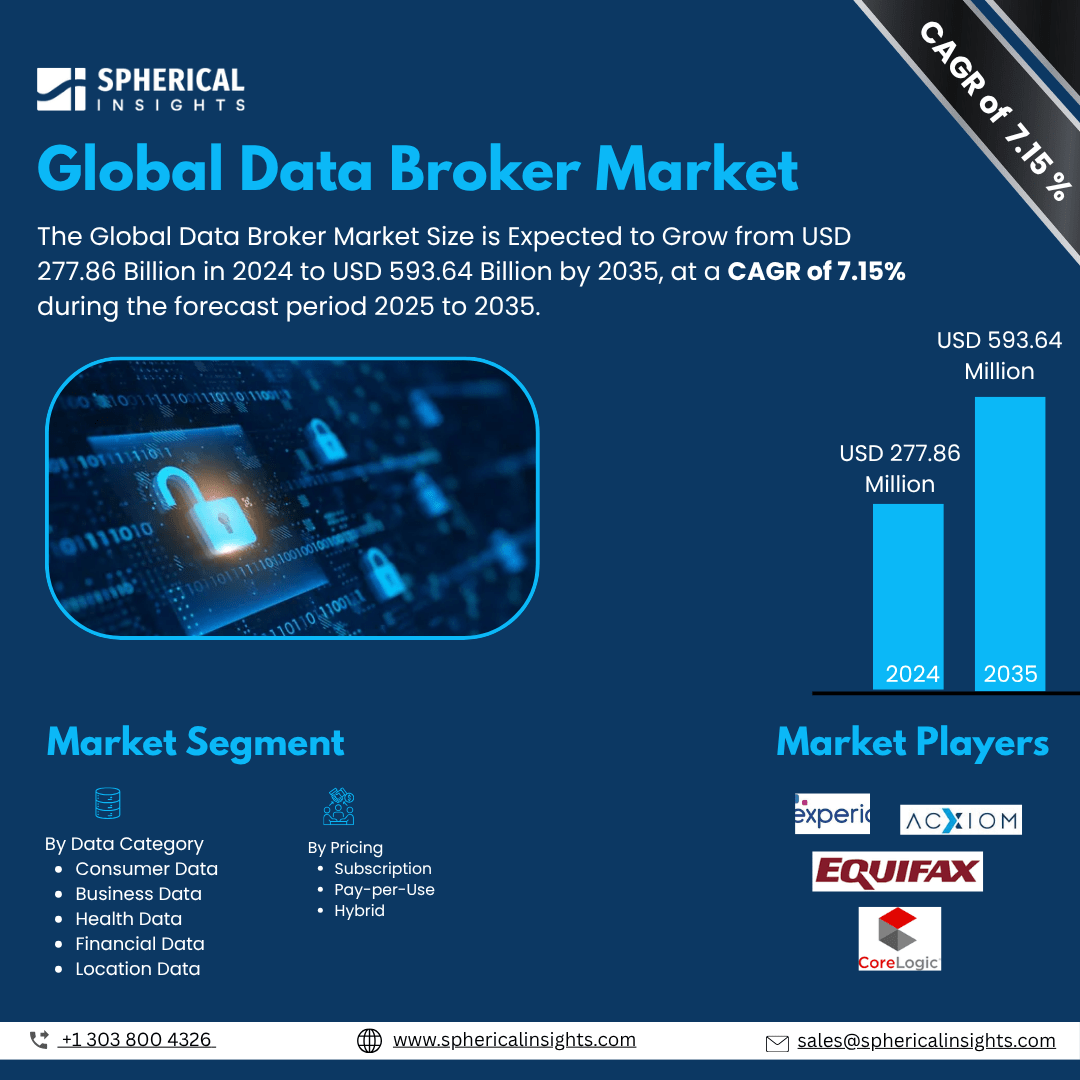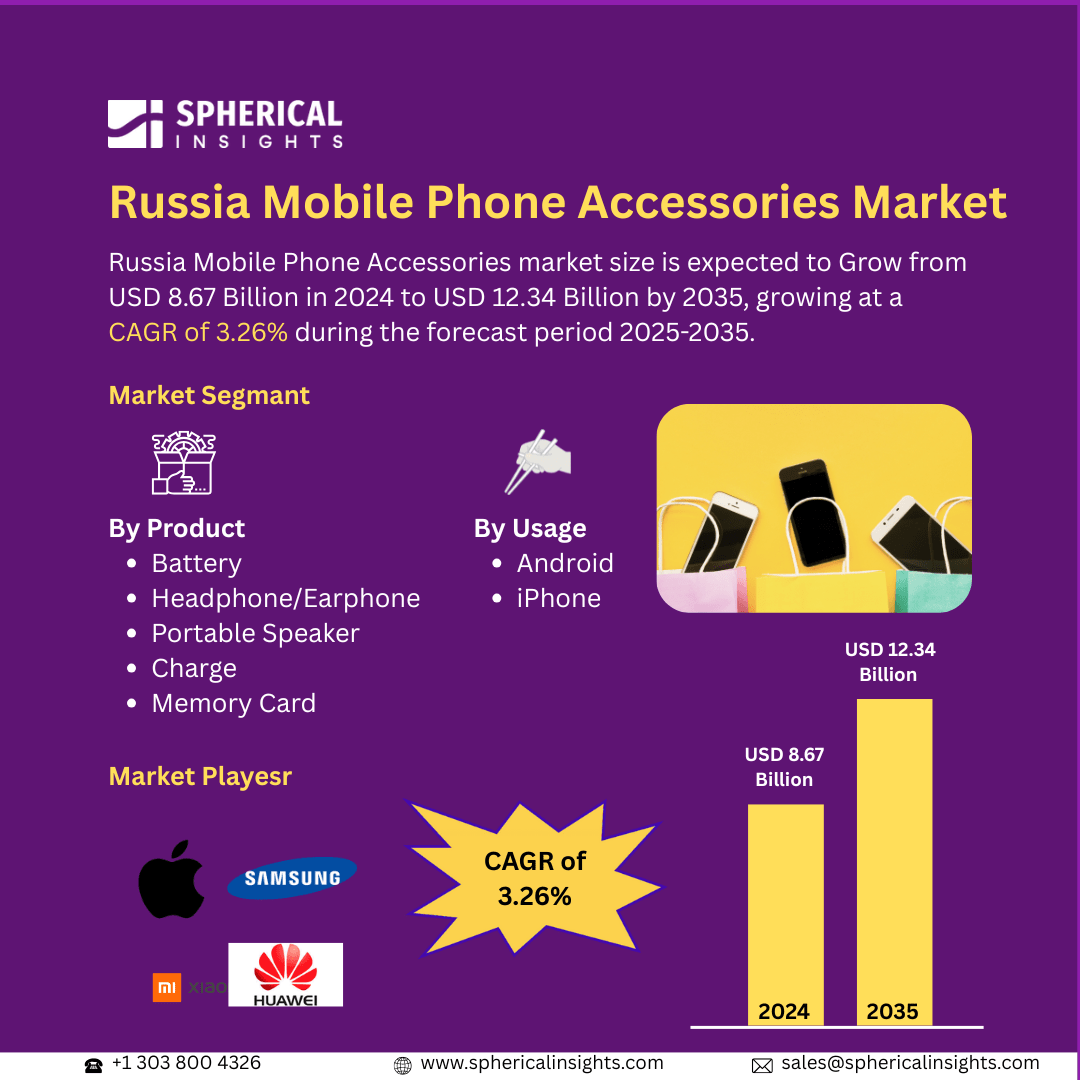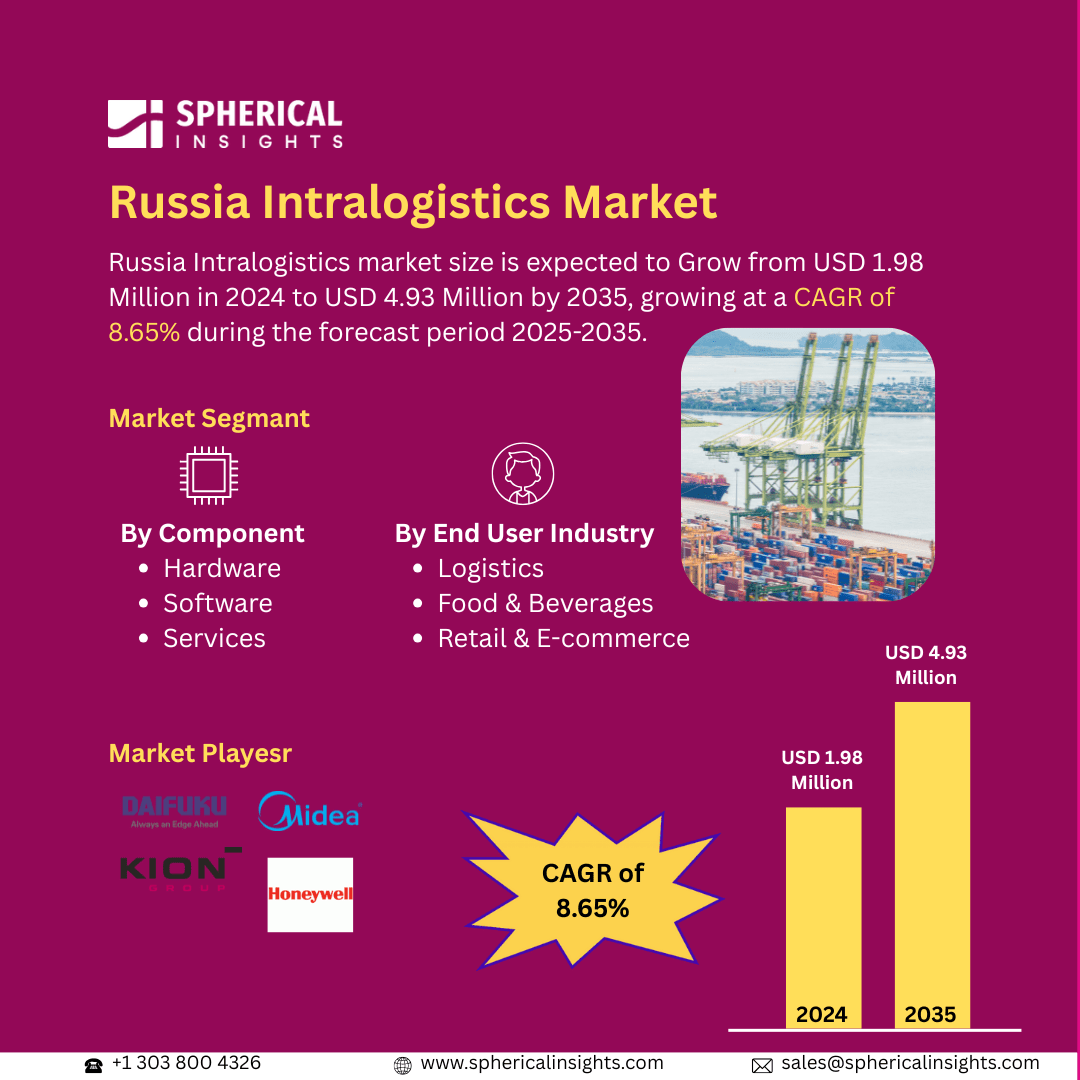Global Data Broker Market Insights Forecasts to 2035
- The Global Data Broker Market Size Was Estimated at USD 277.86 Billion in 2024
- The Market Size is Expected to Grow at a CAGR of around 7.15% from 2025 to 2035
- The Worldwide Data Broker Market Size is Expected to Reach USD 593.64 Billion by 2035
- Asia Pacific is expected to grow the fastest during the forecast period.
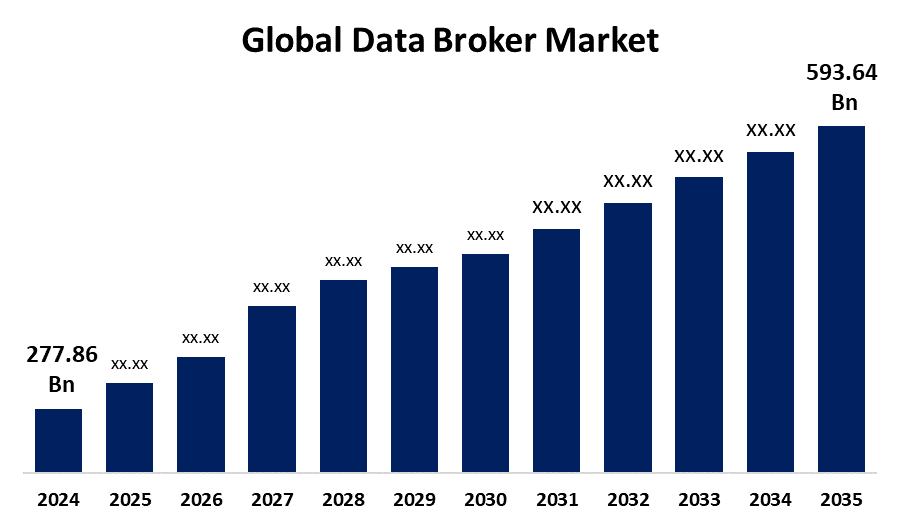
Data Broker Market
The global data broker market involves companies that collect, aggregate, and sell data about individuals and businesses to clients across various industries. Data brokers compile information from multiple sources, including public records, online activities, social media, and transaction histories, to create detailed profiles. These profiles help organizations enhance marketing strategies, customer targeting, and risk assessment. Data brokers act as intermediaries, providing valuable insights that support decision-making processes in sectors such as finance, retail, healthcare, and advertising. The market includes a wide range of data types, from demographic and behavioral data to psychographic and transactional information. As data generation continues to increase globally, data brokers play a vital role in organizing and monetizing this information. Despite concerns about data privacy and security, the data broker market remains a key component of the data-driven economy, enabling businesses to gain competitive advantages through better understanding and engagement with their customers.
Attractive Opportunities in the Data Broker Market
- Data brokers can explore emerging industries such as healthcare, education, and smart cities to offer specialized data solutions. These sectors are increasingly relying on data to improve services, operational efficiency, and decision-making, creating new avenues for growth beyond traditional markets like retail and finance.
- Blockchain technology offers the potential to enhance data transparency, security, and user control. By adopting blockchain, data brokers can build more trustworthy and privacy-conscious business models, which can help address growing regulatory and consumer concerns, thus differentiating themselves in a competitive market.
- The rising demand for real-time, localized data creates opportunities for brokers to innovate and offer tailored, industry-specific products. This can help clients deliver more relevant marketing campaigns and make faster, better-informed decisions, increasing the value proposition of data brokerage services.
Global Data Broker Market Dynamics
DRIVER: Exponential increase in data generation from digital platforms
The exponential increase in data generation from digital platforms, social media, and IoT devices provides a vast amount of information for brokers to collect and analyze. Businesses across industries are increasingly adopting data-driven strategies to enhance customer targeting, personalize marketing campaigns, and improve decision-making, boosting demand for data brokerage services. Advances in artificial intelligence and machine learning enable brokers to process and interpret complex data more effectively, offering deeper insights and predictive analytics. Additionally, the rise of e-commerce and digital advertising fuels the need for precise consumer data to optimize campaigns and improve ROI. Growing adoption of big data analytics by organizations further amplifies market growth. While privacy regulations are evolving, many data brokers adapt by ensuring compliance and enhancing data security, maintaining market momentum. Together, these factors contribute to robust expansion in the data broker industry worldwide.
RESTRAINT: Rising consumer awareness about data privacy
Governments worldwide are implementing stricter data protection laws, such as GDPR in Europe and CCPA in California, which limit how data brokers collect, store, and share personal information. These regulations increase compliance costs and restrict data availability, making it harder for brokers to operate freely. Additionally, rising consumer awareness about data privacy has led to growing skepticism and resistance toward data collection practices. Security breaches and data misuse incidents have further damaged trust in data brokers, prompting calls for greater transparency and accountability. The complexity of managing large volumes of diverse data while ensuring accuracy and ethical use also poses challenges. Moreover, some businesses may hesitate to rely heavily on third-party data due to concerns about data quality and relevance. These factors collectively slow the expansion of the data broker market and create uncertainty about its long-term prospects.
OPPORTUNITY: Expanding into untapped sectors such as healthcare, education, and smart cities
Emerging technologies like blockchain offer potential to enhance data transparency, security, and user control, creating new business models for data brokerage. Additionally, expanding into untapped sectors such as healthcare, education, and smart cities provides opportunities to offer specialized data solutions that improve services and operational efficiency. Increasing demand for real-time and hyper-local data creates avenues for brokers to develop innovative products tailored to specific industry needs. Collaboration with regulatory bodies to develop standardized data-sharing frameworks can build trust and open new markets. Furthermore, rising interest in ethical data sourcing and privacy-first approaches allows brokers to differentiate themselves by adopting responsible practices, appealing to privacy-conscious clients. Lastly, integration of data brokerage with AI-driven decision-making platforms can enhance predictive analytics and automation capabilities, unlocking further value for businesses and accelerating market growth in novel ways.
CHALLENGES: Ensuring data accuracy and quality
One major challenge is ensuring data accuracy and quality, as inconsistent or outdated information can lead to flawed insights and damage client trust. Integrating data from diverse and fragmented sources also poses technical difficulties, requiring sophisticated tools and expertise. Moreover, the complexity of managing massive volumes of data demands robust infrastructure and constant innovation to stay competitive. Ethical concerns around consent and transparency challenge brokers to maintain responsible practices while meeting client demands. The evolving landscape of technology means data brokers must continuously adapt to new data types and formats, such as unstructured social media content or IoT-generated data. Additionally, intense competition within the market pressures brokers to differentiate their offerings and demonstrate clear value. Balancing business growth with these operational, technical, and ethical challenges is critical for sustaining success in the data brokerage industry.
Global Data Broker Market Ecosystem Analysis
The global data broker market ecosystem includes data brokers who collect and aggregate data from providers like social media, e-commerce, and public records. Technology providers offer tools and infrastructure for data analysis. End users, businesses in sectors such as retail, finance, and healthcare, use this data for marketing and decision-making. Regulatory bodies enforce privacy and compliance standards, while cybersecurity firms and auditors ensure data security and integrity. Together, these stakeholders create a dynamic ecosystem balancing data innovation with ethical and legal responsibilities.
Based on the data category, the consumer data segment held the largest revenue share over the forecast period
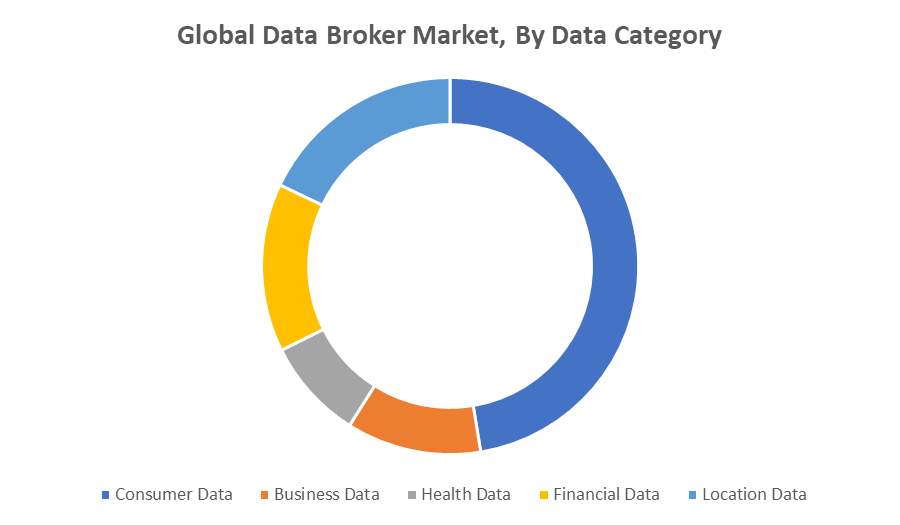
The consumer data segment held the largest revenue share over the forecast period. This is because consumer data, which includes demographic, behavioral, and transactional information, is highly valuable for businesses aiming to personalize marketing, improve customer targeting, and enhance user experience. The extensive availability and demand for consumer insights across industries such as retail, finance, and advertising contribute significantly to the segment’s dominant revenue position in the data broker market.
Based on the pricing, the subscription segment held the largest revenue share during the forecast period
The subscription segment held the largest revenue share during the forecast period. This is due to the consistent demand for ongoing access to updated and comprehensive data, which subscription models provide. Businesses prefer subscriptions for their cost-effectiveness and reliable data flow, enabling continuous insights for better decision-making. The recurring revenue from subscriptions also benefits data brokers by ensuring stable income and fostering long-term client relationships, making this pricing model dominant in the market.
North America is anticipated to hold the largest market share of the data broker market during the forecast period
North America is anticipated to hold the largest market share of the data broker market during the forecast period. This is attributed to the region’s advanced digital infrastructure, widespread adoption of big data analytics, and presence of major data broker companies. Additionally, strong demand from industries such as retail, finance, and healthcare, coupled with supportive technological innovation, drives market growth. North America’s emphasis on data-driven decision-making and marketing strategies further solidifies its leading position in the global data broker market.
Asia Pacific is expected to grow at the fastest CAGR in the data broker market during the forecast period
Asia Pacific is expected to grow at the fastest CAGR in the data broker market during the forecast period. This rapid growth is driven by increasing digitalization, rising internet penetration, and expanding e-commerce activities across the region. Additionally, growing adoption of data analytics by businesses in emerging economies like China, India, and Southeast Asia fuels demand for data brokerage services. The region’s expanding consumer base and investments in advanced technologies further contribute to the accelerating market growth, making Asia Pacific a key area of opportunity for data brokers.
Recent Development
- In March 2023, Acxiom LLC partnered with Amazon Advertising to enhance privacy-focused, data-driven insights for advertisers. This collaboration aims to help advertisers deliver highly relevant and personalized marketing campaigns across Amazon’s platforms and other channels.
Key Market Players
KEY PLAYERS IN THE DATA BROKER MARKET INCLUDE
- Experian Plc
- Acxiom LLC
- Equifax Inc.
- CoreLogic, Inc.
- TransUnion LLC
- Oracle Corporation
- Epsilon Data Management, LLC
- Neustar, Inc.
- Lotame Solutions, Inc.
- KBM Group
- Others
Market Segment
This study forecasts revenue at global, regional, and country levels from 2020 to 2035. Spherical Insights has segmented the data broker market based on the below-mentioned segments:
Global Data Broker Market, By Data Category
- Consumer Data
- Business Data
- Health Data
- Financial Data
- Location Data
Global Data Broker Market, By Pricing
- Subscription
- Pay-per-Use
- Hybrid
Global Data Broker Market, By Regional Analysis
- North America
- Europe
- Germany
- UK
- France
- Italy
- Spain
- Russia
- Rest of Europe
- Asia Pacific
- China
- Japan
- India
- South Korea
- Australia
- Rest of Asia Pacific
- South America
- Brazil
- Argentina
- Rest of South America
- Middle East & Africa
- UAE
- Saudi Arabia
- Qatar
- South Africa
- Rest of the Middle East & Africa
